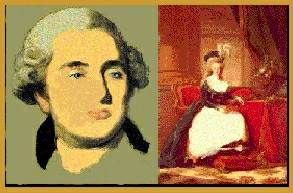|
PinkMonkey Online Study Guide-World History
7.1 Causes Of the French Revolution
Political Causes
The French rulers were not interested in the welfare of the people. This naturally created discontent among the people.
France attained the height of glory under Louis XIV who ruled for twelve years. However, his highly expensive wars and lavish style of living weakened France, economically as well as politically. He gave good advice to his successor Louis XV saying "Do not imitate my fondness for building and for war, but work to lessen the misery of my people."
Louis XV considered state business to be
a bore and engaged himself in pursuing worldly pleasures.
His constant source of enjoyment was Madame de Pompadour and Madame
du Barry. He appointed and dismissed ministers and even declared
wars only to please these women. When his ministers attempted to
discuss affairs of the state with him, he merely remarked, "After
me, the deluge." He was indifferent to the fact that the treasury
was empty after the wars. He adopted a policy of repression by strict
press censorship, arbitrary imprisonment of those seeking reform,
banning and burning literature criticizing the government, thus
endangering personal liberty in France.
Though his successor Louis XVI was intelligent and meant to do well, he lacked the will power to carry out any reforms. Further, he was badly influenced by flattering courtiers and his ill - advised Queen Marie Antoinette who lacked consideration for the people. When she was told that the people had no bread, she remarked casually, "Let them eat cake".

Exhibit 7.1
The French king Louis XVI and his queen Marie Antoinette
Social Causes
There were several invidious distinctions and unjust privileges in the French society that led to the Revolution. French society was divided into three social classes or Estates.
(A) The First Estate was made up of the higher clergy, such as the archbishops, bishops, and the abbots on the one hand and the lower clergymen on the other. The bishops and archbishops led a very luxurious life in their palaces. However the priests had to suffer along with the peasants. So they were antagonistic to each other. Like the nobles, the higher clergy was exempted from paying most of the taxes.
(B) The Second Estate was composed of about 80,000
families in France, who belonged to the nobility. The nobles owned
the most of the land, held important positions in the French administration
and in the army, and were largely free from the payment of taxes.
They lived a life of lordly ease and luxury and enjoyed great privileges.
(C) The Third Estate comprised of the bulk of the French population. They were the peasants and farmers, craftsmen, businessmen, professional people, workers, laborers and the common men. Their life was full of misery and social degradation. Inspite of their education and wealth, the French middle class that is the bourgeoisie, were despised by the first two Estates, and were deeply offended by the social discrimination leveled at them. The peasants were over burdened with taxes, which reduced them to penury. They were humiliated by the nobles who destroyed their fields while hunting. This explains why the Third Estate led the Revolution.
[next page]
|